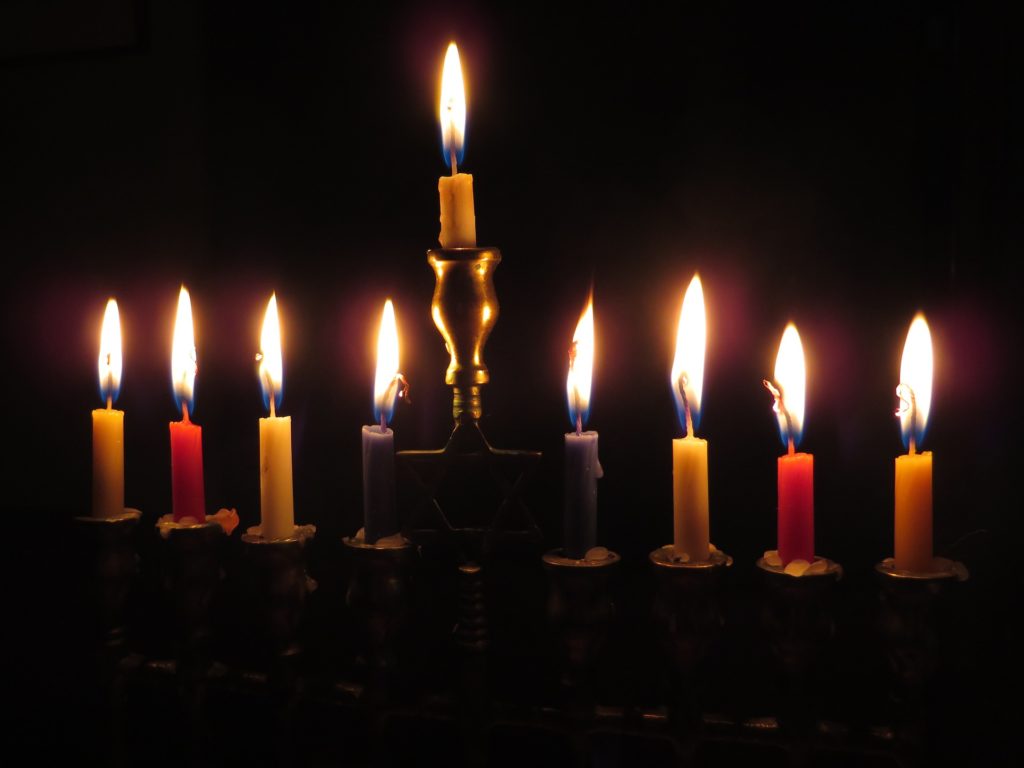- Calls to this hotline are currently being directed to Within Health, Fay or Eating Disorder Solutions
- Representatives are standing by 24/7 to help answer your questions
- All calls are confidential and HIPAA compliant
- There is no obligation or cost to call
- Eating Disorder Hope does not receive any commissions or fees dependent upon which provider you select
- Additional treatment providers are located on our directory or samhsa.gov
Hanukkah and Eating Disorder Recovery: Maintaining Through Traditions

Hanukkah is a beautiful season of celebration for countless individuals and families around the world. For those who celebrate Hanukkah, there may be many traditions that are upheld year after year, passed on through the generations.
Some of the most beloved traditions of Hanukkah might include worship, music, ritual objects, candlelight, and food.
Through all the traditions that are included as part of celebrating Hanukkah, those who might be recovering from an eating disorder can feel overwhelmed during a season that is filled with celebrations and events.
Learning to Maintain Recovery Through Traditions
Sometimes, the hyperfocus on traditions during the celebrations of holidays, such as Hanukkah make it difficult to maintain the day to day necessities that are needed for staying in recovery. Moving into a traditional holiday celebration can also disrupt a structured scheduled that has been followed as a means of maintaining recovery efforts.
For example, many traditional foods are often included as part of the Hanukkah celebration, including the latkes, which are a potato like pancake, and sufganiyot, which are jelly like donuts. If these types of foods are not typically available or eaten at other times of the year, the special, traditional foods of Hanukkah can be difficult to approach for an eating disorder sufferer.
Other Hanukkah traditions may bring together family and friends together in a manner that feels overwhelming or that triggers certain aspects of an eating disorder, such as anxiety or depression.
Traveling, exposure to foods that are not traditionally eaten, following an irregular schedule or having a loose sense of structure, more encounters with family members and friends can all be triggering to an individual in recovery during the Hanukkah season.
Staying Connected to Support
If you celebrate Hanukkah but are feeling overwhelmed in your recovery during the holiday season, know that you do not walk through this alone.
There are many other traditional aspects that can be engaged in during the Hanukkah season that may not be as triggering for someone who is in recovery. For example, participating in ritual ceremonies or worship services may feel more safe that the food aspect related to the Hanukkah celebration.
Work with your support team ahead of time to understand your triggers and to discuss appropriate coping mechanisms that will help you successfully overcome any situations that you might be worried about. You can enjoy this holiday season while maintaining your eating disorder recovery efforts!
Community Discussion – Share your thoughts here!
What resources have been helpful to you during the holiday season?
 About the Author: Crystal is a Masters-level Registered Dietitian Nutritionist (RDN) with a specialty focus in eating disorders, maternal/child health and wellness, and intuitive eating. Combining clinical experience with a love of social media and writing, Crystal serves as the Director of Content and Social Media for Eating Disorder Hope/Addiction Hope, where her passion to help others find recovery and healing is integrated into each part of her work.
About the Author: Crystal is a Masters-level Registered Dietitian Nutritionist (RDN) with a specialty focus in eating disorders, maternal/child health and wellness, and intuitive eating. Combining clinical experience with a love of social media and writing, Crystal serves as the Director of Content and Social Media for Eating Disorder Hope/Addiction Hope, where her passion to help others find recovery and healing is integrated into each part of her work.
As a Certified Intuitive Eating Counselor, Crystal has dedicated her career to helping others establish a healthy relationship with food and body through her work with EDH/AH and nutrition private practice.
The opinions and views of our guest contributors are shared to provide a broad perspective of eating disorders. These are not necessarily the views of Eating Disorder Hope, but an effort to offer discussion of various issues by different concerned individuals.
We at Eating Disorder Hope understand that eating disorders result from a combination of environmental and genetic factors. If you or a loved one are suffering from an eating disorder, please know that there is hope for you, and seek immediate professional help.
Last Updated & Reviewed By: Jacquelyn Ekern, MS, LPC on December 6, 2016
Published on EatingDisorderHope.com

The EatingDisorderHope.com editorial team comprises experienced writers, editors, and medical reviewers specializing in eating disorders, treatment, and mental and behavioral health.

